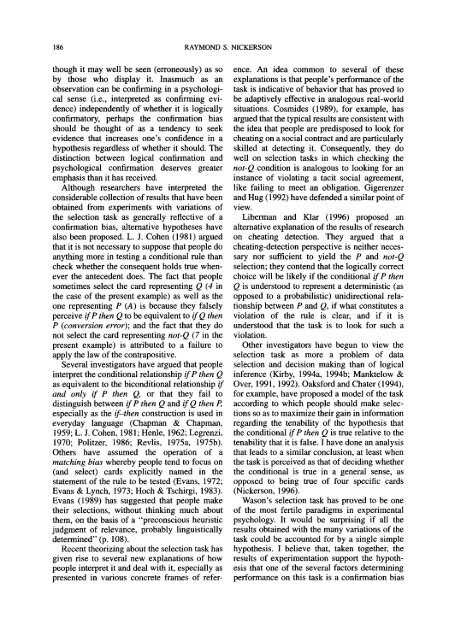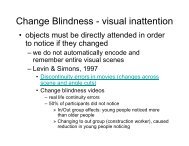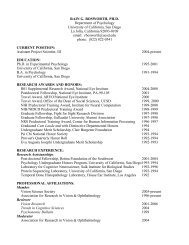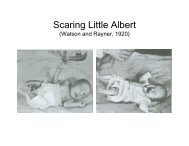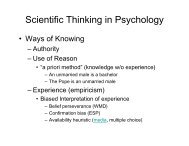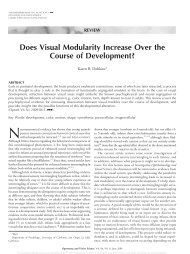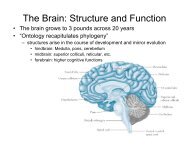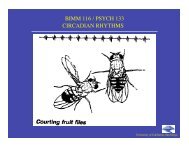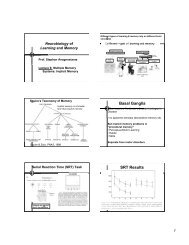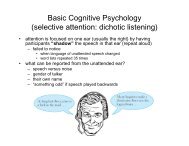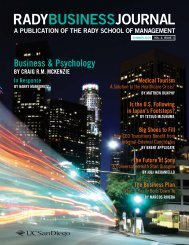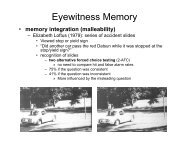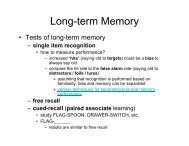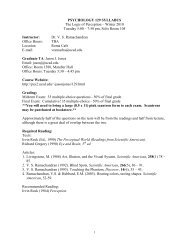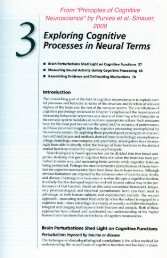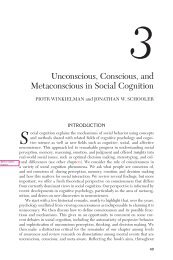Confirmation Bias: A Ubiquitous Phenomenon in Many Guises
Confirmation Bias: A Ubiquitous Phenomenon in Many Guises
Confirmation Bias: A Ubiquitous Phenomenon in Many Guises
You also want an ePaper? Increase the reach of your titles
YUMPU automatically turns print PDFs into web optimized ePapers that Google loves.
186 RAYMOND S. NICKERSON<br />
though it may well be seen (erroneously) as so<br />
by those who display it. Inasmuch as an<br />
observation can be confirm<strong>in</strong>g <strong>in</strong> a psychological<br />
sense (i.e., <strong>in</strong>terpreted as confirm<strong>in</strong>g evidence)<br />
<strong>in</strong>dependently of whether it is logically<br />
confirmatory, perhaps the confirmation bias<br />
should be thought of as a tendency to seek<br />
evidence that <strong>in</strong>creases one's confidence <strong>in</strong> a<br />
hypothesis regardless of whether it should. The<br />
dist<strong>in</strong>ction between logical confirmation and<br />
psychological confirmation deserves greater<br />
emphasis than it has received.<br />
Although researchers have <strong>in</strong>terpreted the<br />
considerable collection of results that have been<br />
obta<strong>in</strong>ed from experiments with variations of<br />
the selection task as generally reflective of a<br />
confirmation bias, alternative hypotheses have<br />
also been proposed. L. J. Cohen (1981) argued<br />
that it is not necessary to suppose that people do<br />
anyth<strong>in</strong>g more <strong>in</strong> test<strong>in</strong>g a conditional rule than<br />
check whether the consequent holds true whenever<br />
the antecedent does. The fact that people<br />
sometimes select the card represent<strong>in</strong>g Q (4 <strong>in</strong><br />
the case of the present example) as well as the<br />
one represent<strong>in</strong>g P (A) is because they falsely<br />
perceive ifP then Q to be equivalent to ifQ then<br />
P (conversion error); and the fact that they do<br />
not select the card represent<strong>in</strong>g not-Q (7 <strong>in</strong> the<br />
present example) is attributed to a failure to<br />
apply the law of the contrapositive.<br />
Several <strong>in</strong>vestigators have argued that people<br />
<strong>in</strong>terpret the conditional relationship ifP then Q<br />
as equivalent to the biconditional relationship if<br />
and only if P then Q, or that they fail to<br />
dist<strong>in</strong>guish between ifP then Q and ifQ then P,<br />
especially as the if-then construction is used <strong>in</strong><br />
everyday language (Chapman & Chapman,<br />
1959; L. J. Cohen, 1981; Henle, 1962; Legrenzi,<br />
1970; Politzer, 1986; Revlis, 1975a, 1975b).<br />
Others have assumed the operation of a<br />
match<strong>in</strong>g bias whereby people tend to focus on<br />
(and select) cards explicitly named <strong>in</strong> the<br />
statement of the rule to be tested (Evans, 1972;<br />
Evans & Lynch, 1973; Hoch & Tschirgi, 1983).<br />
Evans (1989) has suggested that people make<br />
their selections, without th<strong>in</strong>k<strong>in</strong>g much about<br />
them, on the basis of a "preconscious heuristic<br />
judgment of relevance, probably l<strong>in</strong>guistically<br />
determ<strong>in</strong>ed" (p. 108).<br />
Recent theoriz<strong>in</strong>g about the selection task has<br />
given rise to several new explanations of how<br />
people <strong>in</strong>terpret it and deal with it, especially as<br />
presented <strong>in</strong> various concrete frames of refer-<br />
ence. An idea common to several of these<br />
explanations is that people's performance of the<br />
task is <strong>in</strong>dicative of behavior that has proved to<br />
be adaptively effective <strong>in</strong> analogous real-world<br />
situations. Cosmides (1989), for example, has<br />
argued that the typical results are consistent with<br />
the idea that people are predisposed to look for<br />
cheat<strong>in</strong>g on a social contract and are particularly<br />
skilled at detect<strong>in</strong>g it. Consequently, they do<br />
well on selection tasks <strong>in</strong> which check<strong>in</strong>g the<br />
not-Q condition is analogous to look<strong>in</strong>g for an<br />
<strong>in</strong>stance of violat<strong>in</strong>g a tacit social agreement,<br />
like fail<strong>in</strong>g to meet an obligation. Gigerenzer<br />
and Hug (1992) have defended a similar po<strong>in</strong>t of<br />
view.<br />
Liberman and Klar (1996) proposed an<br />
alternative explanation of the results of research<br />
on cheat<strong>in</strong>g detection. They argued that a<br />
cheat<strong>in</strong>g-detection perspective is neither necessary<br />
nor sufficient to yield the P and not-Q<br />
selection; they contend that the logically correct<br />
choice will be likely if the conditional ifP then<br />
Q is understood to represent a determ<strong>in</strong>istic (as<br />
opposed to a probabilistic) unidirectional relationship<br />
between P and Q, if what constitutes a<br />
violation of the rule is clear, and if it is<br />
understood that the task is to look for such a<br />
violation.<br />
Other <strong>in</strong>vestigators have begun to view the<br />
selection task as more a problem of data<br />
selection and decision mak<strong>in</strong>g than of logical<br />
<strong>in</strong>ference (Kirby, 1994a, 1994b; Manktelow &<br />
Over, 1991, 1992). Oaksford and Chater (1994),<br />
for example, have proposed a model of the task<br />
accord<strong>in</strong>g to which people should make selections<br />
so as to maximize their ga<strong>in</strong> <strong>in</strong> <strong>in</strong>formation<br />
regard<strong>in</strong>g the tenability of the hypothesis that<br />
the conditional ifP then Q is true relative to the<br />
tenability that it is false. I have done an analysis<br />
that leads to a similar conclusion, at least when<br />
the task is perceived as that of decid<strong>in</strong>g whether<br />
the conditional is true <strong>in</strong> a general sense, as<br />
opposed to be<strong>in</strong>g true of four specific cards<br />
(Nickerson, 1996).<br />
Wason's selection task has proved to be one<br />
of the most fertile paradigms <strong>in</strong> experimental<br />
psychology. It would be surpris<strong>in</strong>g if all the<br />
results obta<strong>in</strong>ed with the many variations of the<br />
task could be accounted for by a s<strong>in</strong>gle simple<br />
hypothesis. I believe that, taken together, the<br />
results of experimentation support the hypothesis<br />
that one of the several factors determ<strong>in</strong><strong>in</strong>g<br />
performance on this task is a confirmation bias


